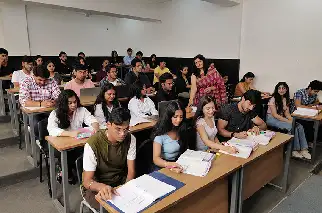Residential Services
MREI provides on-campus and off-campus hostel facilities for boys and
girls with various types of rooms. Students can choose single,
double, and triple rooms as per their preference.
Key Points
Room Types: The hostels offer different types of
rooms to suit
different budgets and preferences:
- Air-conditioned and non-air-conditioned rooms
- Single-seater, two-seater, three-seater, and five-seater
rooms
- The rooms can be equipped with attached or common toilets
as per the choice of room category.
Fee Structure: The hostel fee is to be paid on the
basis of the room category chosen by the student and it can be paid
through DD (Demand Draft) or in cash.
Additional Facilities:
- Medical services and medical insurance to keep the
students fit.
- Library facilities for access to study materials and
academic inputs.
- Laundry facilities as included in the hostel fees, to
ease the life of students.
Mess Plan
At Manav Rachna, we offer world-class sports facilities to keep our
students fit and active. Our facilities comprise a range of outdoor
and indoor games, including:
Sports
Mess plan also comes as part of hostel fee. Healthy food is served
through the mess considering the multicultural requirements of
different food habits for the students. By providing choices
involving vegetarian as well as non-vegetarian options, healthy
lifestyle is available for the students enabling them to pursue
their studies focusing on programs
with full seriousness.
- Basketball, volleyball, cricket, soccer, chess, and carom
among
others.
Notable facilities include:
- A 25m shooting range and a 10m air-conditioned indoor
shooting range with Olympic-standard SIUS Ascor electronic
targets.
- Indoor badminton and table tennis stadia with synthetic
courts in association with Yonex and Stag.
- A Semi-Olympic pool for swimming and a Soccer Academy for
students who have sporting interest and passion.
- A Sports Fitness Centre to service psychological,
physiotherapy, and other aspects of health for students.
The facilities enable students to pursue physical
exercises that complement their academic development.
Laundry
Laundry facilities are available at an extra fee in the hostel fees.
This saves students from worrying about laundry, so they can focus
on their studies, and also allows their clothes to remain properly
cleaned.
Parking
There is a vast parking space facility available for students who
commute using their own means of transport. It is provided to cater
to the requirements of students, so that their travel will be easy and
hassle-free.
Transport
Our well-maintained transport facility offers a stress-free, secure,
and safe journey for students from Delhi and Gurugram. The
GPS-located, contemporary fleet of buses is operated by
professionally trained personnel, with onboard support staff to
assist students. Our emphasis is on reliability, safety, and
convenience, ensuring unproblematic travel to and from the campus.



 0
0 



















